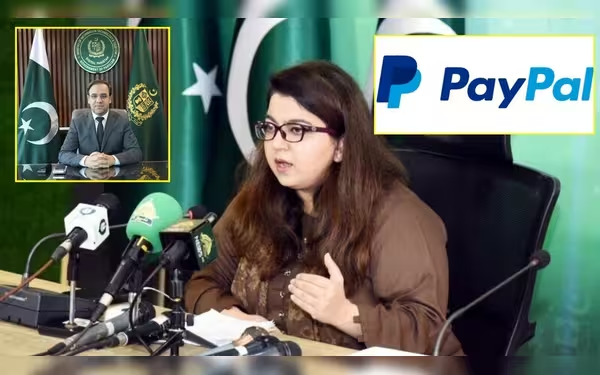Saturday, November 16, 2024 05:30 PM
IT Minister Clarifies PayPal Deal Controversy in Pakistan
- Minister claims deal was sabotaged by Dr. Umar Saif.
- Khawaja emphasizes no intention to accuse anyone.
- PayPal's introduction could boost Pakistan's digital economy.
 Image Credits: thecurrentpk
Image Credits: thecurrentpkIT Minister Shaza Fatima Khawaja clarifies her remarks on the PayPal deal, emphasizing no intention to accuse anyone amid controversy.
In recent discussions surrounding the potential introduction of PayPal to Pakistan, Shaza Fatima Khawaja, the Minister of State for IT and Telecommunication, made headlines with her remarks. The topic of PayPal, a widely used online payment platform, has been a point of interest for many in Pakistan, especially among businesses and freelancers who seek to engage in international transactions. The possibility of PayPal operating in Pakistan has been a long-standing desire for many, as it would facilitate smoother financial operations and enhance the country’s digital economy.
During a press conference, Khawaja stated that a deal to bring PayPal to Pakistan was allegedly undermined by former caretaker federal minister Dr. Umar Saif. She claimed that Dr. Saif leaked information about the deal prematurely, which led to PayPal's dissatisfaction and ultimately sabotaged the agreement. Khawaja expressed her frustration, saying, "Bringing PayPal to Pakistan was a private deal, which Dr. Saif leaked before time. This action annoyed PayPal and he (Dr. Umar) sabotaged it." These comments sparked a wave of reactions across social media and news platforms.
However, following the backlash from her statement, Khawaja took to Twitter to clarify her position. She emphasized that her words had been taken out of context, stating, "I have been quoted out of context." The Minister further explained that her intention was never to accuse or blame anyone specifically. This clarification indicates her desire to maintain a diplomatic stance while addressing the sensitive issue of international business relations.
The situation raises important questions about the dynamics of political influence on business negotiations in Pakistan. The introduction of PayPal could significantly impact the local economy, providing opportunities for entrepreneurs and freelancers to access global markets. However, the potential for political interference in such deals could deter foreign companies from entering the Pakistani market.
While the dream of having PayPal in Pakistan remains alive, it is crucial for all parties involved to approach negotiations with transparency and integrity. The government must ensure that such deals are protected from political maneuvering to foster a conducive environment for international business. As the digital landscape continues to evolve, the hope is that Pakistan will soon embrace platforms like PayPal, paving the way for a more connected and financially inclusive future.













